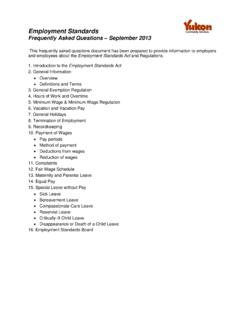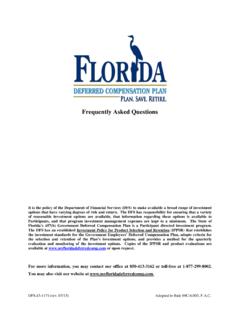Transcription of Frequently Asked Questions - HQAA
1 Frequently Asked Questions Concerning the Revised standards for DMEPOS Suppliers CMS 6036 F (Effective September 27, 2010) Supplier Standard 1 1. Can you discuss when contracting arrangements for licensed services are allowable? A. We are interpreting our regulation at 42 (c)(1)(ii)(C) to mean that a supplier may contract with an individual or other entity to provide licensed services unless State law expressly prohibits such an arrangement. Similarly, the restriction at 42 (c) (10(ii) (B) shall only require an employment arrangement where State law expressly prohibits other contractual arrangements ( independent contractor arrangements). In the absence of an express prohibition against independent contractor and other contractual arrangements ( through relevant state law, through relevant case law, etc.))
2 , we interpret our regulation to allow such arrangements. Supplier Standard 7 1. I own an optical shop that is located within an optometrists or ophthalmologists office. The optical shop part is less than 200 square feet and does not have a separate entrance. The physician's total office space is at least 200 square feet. Is this allowable? A. Yes. 2. Supplier locations are now required to be a minimum of 200 square feet, with exceptions for state . licensed orthotic and prosthetic personnel providing custom fabricated orthotics or prosthetics in private practice. Whom does this exemption apply to? A. This exemption will NOT apply to any other supplier type, nor will it apply to any orthotist or prosthetist that is not state licensed, even if the state does not provide/require licenses.
3 3. What is required to be in the 200 square feet requirement for suppliers? A. The 200 square feet includes all space within the supplier location (storage, administrative areas, etc.) but does NOT include any off site areas (inventory and/or central records storage). 4. Can you describe how you will implement the restrictions concerning a gated community or other area where access is restricted ? A. Any residential community or single residential or non residential structure to which vehicular or pedestrian access is restricted by secured barriers including, but not limited to fences, security doors, gates, or other devices that are not directly affixed to the physical structure housing the supplier's facility if a single unit building or the supplier's leased space if in a multi.
4 Tenant building. Access under these circumstances is deemed restricted and not appropriate unless one of the following applies: a. The physical barrier to the community and/or structure is staffed (in person) by security personnel, receptionist or similar individual that could immediately grant entrance and direct a beneficiary or CMS representative to the supplier's facility or could notify the supplier so that they can escort the visitor to their facility that is located beyond the security barrier. b. The supplier has a clearly identified means of electronic/voice communication immediately adjacent to the secured physical barrier and that communication is sent directly to and answered by an employee of the supplier that could grant immediate access to the facility.
5 The intent is to deem inappropriate those residences behind gates where a beneficiary must call a phone number via a call system that is not clearly marked with the name of the business to get access or that does not have a security officer that can immediately make contact with the supplier. It is the intent to not prohibit suppliers from operating in facilities that do have appropriate and reasonable security features that may slightly delay access but not restrict it. 5. Could you confirm that it is permissible to use an off site, third party ( Vendor or third party biller) to store records if they could be retrieved quickly? A. It is not permissible to use an off site third party to store records even if they could be retrieved quickly. Supplier Standard 11 1.
6 With regard to solicitation of beneficiaries, we would like to know who is the supplier for purposes of contacting beneficiaries. Where an affiliated entity (such as another enrolled LLC under same parent corporation) has received written permission to contact a beneficiary or has furnished covered items to the beneficiary in the past, is that affiliated entity considered also to be the supplier for purposes of contacting beneficiaries? The third exception, relating to the furnishing of another Medicare covered item in the preceding 15 months, suggests that an entity is permitted to reach out to beneficiaries who have been furnished other covered items by related organizations. A. The affiliated company is not considered to be the supplier for purposes of contacting the beneficiary unless the affiliated company is in itself an enrolled supplier that is allowed to contact the beneficiary in accordance with (c) (11).
7 The related company cannot reach out to beneficiaries. 2. Does direct solicitation include mailings through the US Post Office? Neither the rule or the preamble appears to address this. A. We believe that general mass advertising through the post office is not prohibited. Targeted mailings to specific beneficiaries are prohibited. 3. Is a supplier contacting the beneficiary based on the receipt of a physician order considered an unsolicited contact? What if a supplier contacts the beneficiary based solely on the physician order (and therefore the contact is without the beneficiary's knowledge that the physician would be contacting a supplier on the beneficiary's behalf)? A. Yes it is unsolicited unless the physician has written permission from the beneficiary allowing the supplier to contact the beneficiary.
8 4. If a supplier makes solicited contact with the beneficiary for a particular covered item, can the supplier speak with the beneficiary about additional covered items during that same contact? A. Unless the supplier has already furnished a Medicare covered item to the beneficiary within the past 15 months then the answer is No. Supplier Standard 29 1. Does ownership by an integrated hospital system of a DME supplier through its subsidiaries meet the exception if: a. The hospital system also owns a Part A provider hospital and b. The hospital (Part A provider) and DME supplier to co locate. A. Yes, if all are wholly owned by the parent entity. 2. If a Part A provider owns at least 50% of a DME Supplier, are those entities permitted to co locate? A. No, the ownership must be 100% 3.
9 NSC operational standards permit separate supplier numbers to be issued to suppliers who have separate, valid suites in the same building that are recognized by the US postal service. Does the same answer apply in a similar situation where a DME supplier and a Part A provider co locate? A. With regard to co location of DMEPOS suppliers, a DMEPOS supplier in the same building as another DMEPOS supplier is not considered to be sharing a practice location with another supplier if it has a separate suite, separate address, a separate entrance from the outside, a separate telephone number and using separate equipment. The supplier must also separately meet all supplier standards . 4. If a DME supplier decides to co exist with a sleep lab that is jointly owned by physicians and a related hospital system entity and has separate and distinct entrances into the facilities, is this permissible under the supplier standard rule?
10 The sleep lab bills Medicare for its services under Medicare Part B. A. Yes. As indicated in the aforementioned response, the supplier must have a separate and distinct suite recognized by the post office and must independently meet all supplier standards . They should not share personnel, equipment or inventory. 5. Is it permissible for a parent company of two separately enrolled DMEPOS suppliers to have one master lease for two separate practice locations (or alternately, that each DMEPOS supplier may sublease from the parent company? A. Yes. 6. Does the new regulation apply to a DMEPOS supplier sharing a practice location with any other supplier or provider, not just another DMEPOS supplier? A. Yes. However, there are exceptions as stated in 42 Code of Federal Regulations (c) (29) (ii).)



